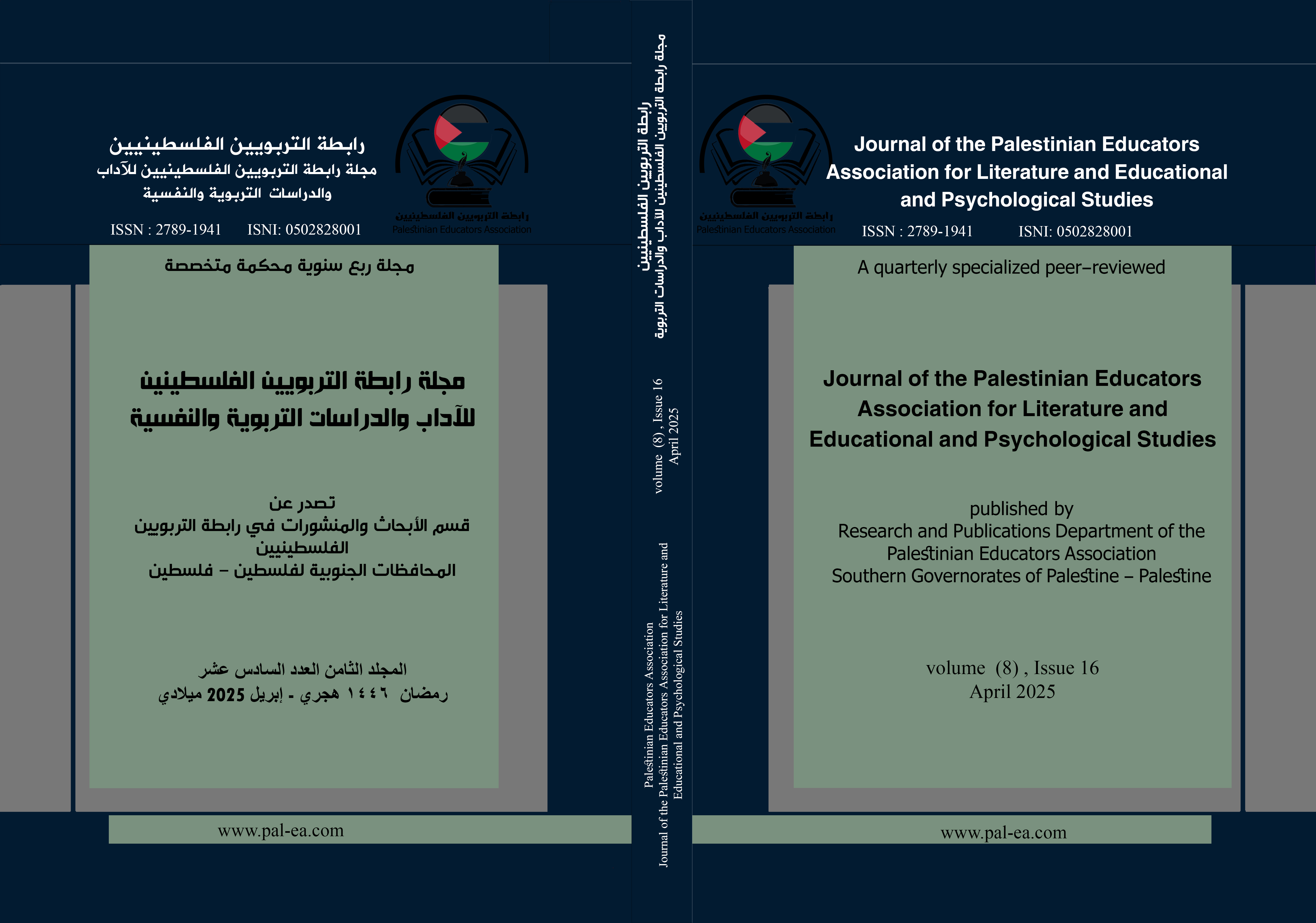الأنموذج القرآني للمجتمع الراشد وإسهاماته البنيوية والتربوية في تجسيد مقاصد الشريعة الإسلامية: دراسة تحليلية تأصيلية
Keywords:
Ideal society, justice, consultation (Shura), Islamic education, sustainable development.Abstract
This study aimed to explore the structural and educational foundations of an ideal Islamic society, focusing on the challenges hindering its realization and proposing practical strategies for its activation. The study employed a descriptive-analytical methodology alongside scriptural reasoning, relying on traditional and contemporary references to ensure credibility. Findings revealed that structural foundations such as justice, consultation (Shura), social solidarity, and moral values are the backbone of a stable and integrated society. Additionally, Islamic education plays a pivotal role in shaping individuals’ personalities from an early age through family and school. However, Islamic societies face intellectual and cultural challenges due to Western cultural influences, alongside social and economic issues like poverty and family disintegration. To achieve an ideal society, the study recommended enhancing Islamic education by revising curricula, and utilizing modern media to promote Islamic values in engaging ways. It also emphasized implementing justice and Shura to ensure community participation, and using Zakat and charity to achieve sustainable development and reduce poverty. Furthermore, it suggested promoting volunteerism and supporting community institutions to strengthen social bonds. Finally, the study called for further field research to develop actionable strategies for building a society that fulfills the objectives of Islamic law (Maqasid al-Sharia). These recommendations aim to create a stable, integrated society rooted in Islamic principles while addressing contemporary challenges effectively.
Downloads
References
قائمة المصادر والمراجع
القرآن الكريم.
المراجع العربية
القرضاوي، يوسف. (2005).الشريعة الإسلامية وأهدافها الكبرى. القاهرة: دار الشروق.
الغزالي، محمد. (1998).الإسلام والتنمية المستدامة. القاهرة: دار السلام.
الشعراوي، محمد متولي. (1990). تفسير القرآن الكريم. القاهرة: مكتبة الندوة.
الصابوني، محمد علي. (1980).صفات المجتمع المسلم في الإسلام. دمشق: دار القلم.
بن باز، عبد العزيز. (1995). فتاوى ابن باز. الرياض: دار العاصمة.
النجار، عبد المجيد. (2017).قضايا الفكر الإسلامي المعاصر. القاهرة: دار الفكر العربي.
رمضان، طارق. (2013).الإسلام والحداثة: رؤية متجددة. بيروت: مركز دراسات الوحدة العربية.
شحرور، محمد. (2010).الإسلام والإنسان: قراءة جديدة في الإسلام. دمشق: دار الحوار.
عثمان، فتحي. (2019).تحديات المجتمع الإسلامي في العصر الحديث. القاهرة: دار المعارف.
عمارة، محمد. (2012).الهوية الثقافية للمجتمع الإسلامي. القاهرة: دار الشروق.
زیدان، عبد الكريم. (2015). نحو مجتمع إسلامي راشد. عمان: دار الفرقان.
الغنوشي، راشد. (2018). الديمقراطية والشورى في الإسلام. بيروت: مركز دراسات الوحدة العربية.
شريعتي، علي. (2007). الإسلام والمجتمع الراشد. طهران: دار الكتاب الحديث.
الطبري، محمد بن جرير. (1984). تفسير الطبري: جامع البيان عن تأويل آي القرآن. بيروت: دار إحياء التراث العربي.
الفيروزآبادي، مجد الدين. (1984). القاموس المحيط. بيروت: دار الكتب العلمية.
الزمخشري، جار الله. (1987). أساس البلاغة. القاهرة: دار الفكر.
المراجع العربية الإنجليزية
Al-Qaradawi, Y. (2005). Islamic Sharia and its major objectives (In Arabic) . Cairo: Dar Al-Shorouk.
Al-Ghazali, M. (1998). Islam and sustainable development (In Arabic) . Cairo: Dar Al-Salam.
Al-Sha'rawi, M. M. (1990). Interpretation of the Holy Quran (In Arabic) . Cairo: Al-Nadwa Library.
Al-Sabouni, M. A. (1980). Characteristics of the Muslim society in Islam (In Arabic) . Damascus: Dar Al-Qalam.
Bin Baz, A. A. (1995). Fatwas of Ibn Baz (In Arabic) . Riyadh: Dar Al-Asima.
Al-Najjar, A. M. (2017). Issues of contemporary Islamic thought (In Arabic) . Cairo: Dar Al-Fikr Al-Arabi.
Ramadan, T. (2013). Islam and modernity: A renewed vision (In Arabic) . Beirut: Center for Arab Unity Studies.
Shahrour, M. (2010). Islam and humanity: A new reading of Islam (In Arabic) . Damascus: Dar Al-Hiwar.
Othman, F. (2019). Challenges of the Islamic society in the modern era (In Arabic) . Cairo: Dar Al-Maaref.
Amara, M. (2012). The cultural identity of the Islamic society (In Arabic) . Cairo: Dar Al-Shorouk.
Zidan, A. K. (2015). Towards an ideal Islamic society (In Arabic) . Amman: Dar Al-Furqan.
Ghannouchi, R. (2018). Democracy and consultation (Shura) in Islam (In Arabic) . Beirut: Center for Arab Unity Studies.
Shariati, A. (2007). Islam and the ideal society (In Arabic) . Tehran: Modern Book House.
Al-Tabari, M. B. J. (1984). Tafsir Al-Tabari: The comprehensive explanation of the meanings of the Quran (In Arabic) . Beirut: Dar Ihya Al-Turath Al-Arabi.
Al-Fayrouzabadi, M. J. D. (1984). Al-Qamus Al-Muhit (In Arabic) . Beirut: Dar Al-Kutub Al-Ilmiyyah.
Al-Zamakhshari, J. A. (1987). Asas Al-Balagha (In Arabic) . Cairo: Dar Al-Fikr.
The Holy
Published
Issue
Section
License
Copyright (c) 2025 الأستاذة شيماء عماد أبو غوري ، الدكتور محمد حسن أبو رحمة (مؤلف)

This work is licensed under a Creative Commons Attribution-NonCommercial-ShareAlike 4.0 International License.
The Journal of the Palestinian Educators Association for Literature, Educational and Psychological Studies
E-issn: 2789-1941
Authors retain Copyright
The Journal of the Palestinian Educators Association for Literature, Educational and Psychological Studies allows Authors retain Copyright and grant the journal right of first publication with the work simultaneously licensed under a Creative Commons Attribution (CC-BY) 4.0 License that allows others to share the work with an acknowledgment of the work’s authorship and initial publication in this journal.
Provided they are the owners of the Copyright to their work, authors are able to enter into separate, additional contractual arrangements for the non-exclusive distribution of the journal’s published version of the work (e.g., post it to an institutional repository, in a journal or publish it in a book), with an acknowledgment of its initial publication in this journal.
Authors are permitted and encouraged to post their work online (e.g., in institutional repositories, disciplinary repositories, or on their website) prior to
and during the submission process.










